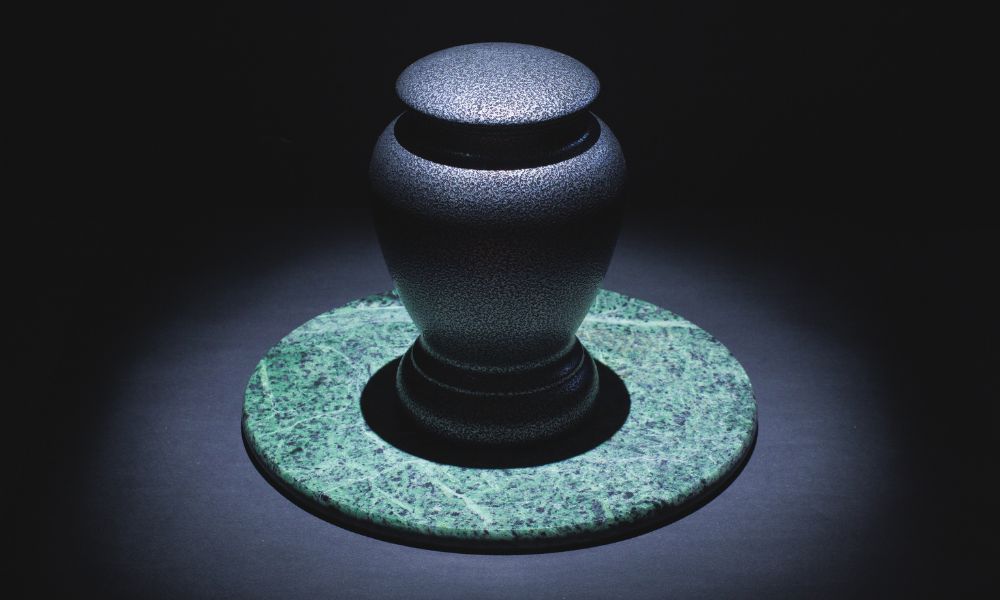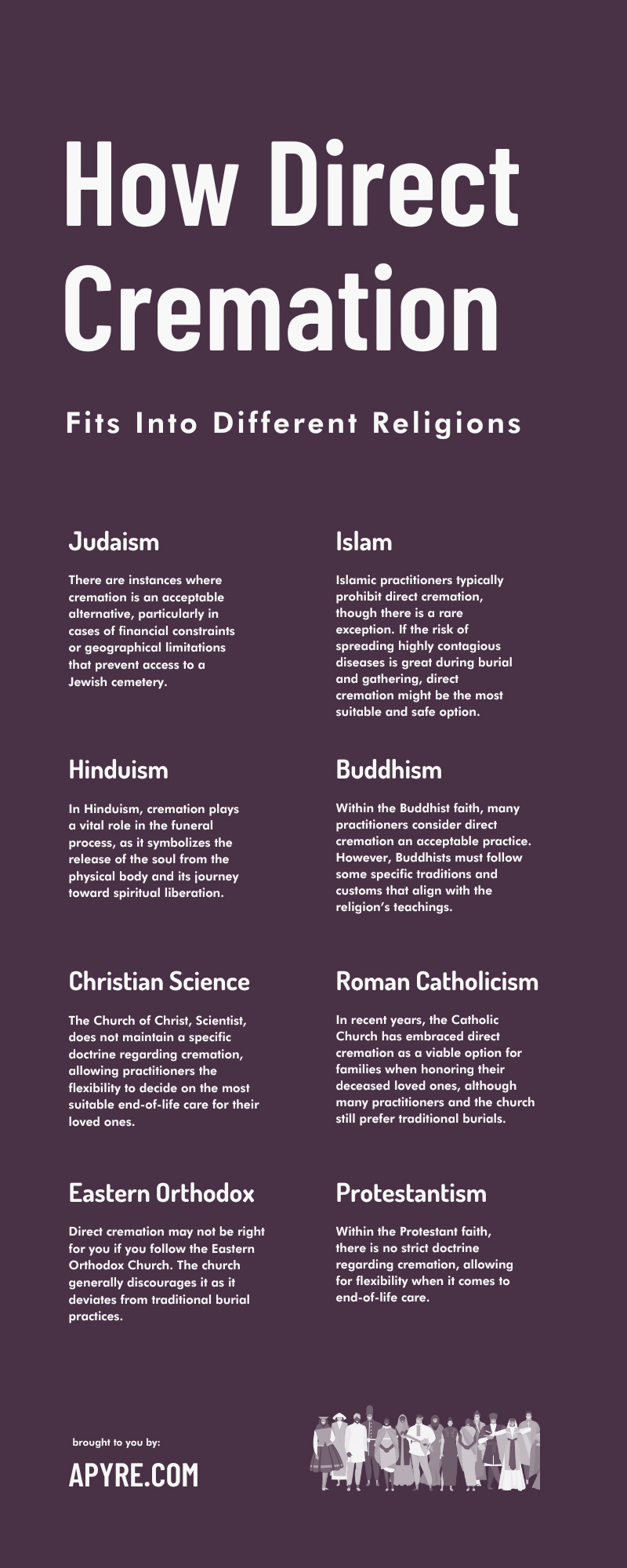How Direct Cremation Fits Into Different Religions

In today’s diverse world, end-of-life care is a deeply personal and spiritual journey that varies greatly across different religious backgrounds. Direct cremation, a process involving the immediate cremation of a deceased individual without a formal funeral service, has become an increasingly popular choice. It’s a good choice for families seeking a respectful and meaningful way to commemorate their loved ones, but practitioners of different religions view direct cremation differently. If you want to practice your faith, it’s important to understand its view of direct cremation before making any end-of-life decisions.
Judaism
Adhering to traditional burial customs is one of the most appropriate and respectful ways to honor a deceased loved one within the Jewish faith. Despite this preference, there are instances where cremation is an acceptable alternative, particularly in cases of financial constraints or geographical limitations that prevent access to a Jewish cemetery.
If a family chooses cremation under these circumstances, it’s important to follow proper guidelines and bury the ashes in a traditional burial site instead of at home. By doing so, families can maintain a sense of respect and adherence to their religious beliefs while navigating the complex process of end-of-life care.
Islam
End-of-life care in the Islamic faith places a strong emphasis on the sanctity and dignity of the deceased. Because of this, Islamic practitioners typically prohibit direct cremation, though there is a rare exception. If the risk of spreading highly contagious diseases is great during burial and gathering, direct cremation might be the most suitable and safe option. However, the family must receive permission from the proper Muslim authorities.
The preferred burial method involves conducting funeral rites promptly and burying the body in a cemetery to ensure everyone pays proper respect to their loved ones. By adhering to these guidelines, followers of Islam can uphold their religious values and provide a fitting farewell for their loved ones. In addition to paying proper respects, these burials ensure that the deceased’s final resting place aligns with the faith’s teachings.
Hinduism
In Hinduism, cremation plays a vital role in the funeral process, as it symbolizes the release of the soul from the physical body and its journey toward spiritual liberation. This belief system considers direct cremation an acceptable option, allowing for flexibility in end-of-life care while still adhering to religious customs.
Families who opt for direct cremation can find solace and comfort during a challenging period, knowing that their loved one’s transition into the afterlife aligns with their faith’s principles. Additionally, this method offers a more streamlined approach to the cremation process, providing a sense of peace and closure for those at the end of their lives.
Buddhism
Within the Buddhist faith, many practitioners consider direct cremation an acceptable practice. However, Buddhists must follow some specific traditions and customs that align with the religion’s teachings. As part of the end-of-life care process, Buddhists must hold a funeral service that commemorates the deceased. This service plays a significant role in acknowledging their journey through the cycle of birth, death, and rebirth. By opting for direct cremation while still upholding meaningful funeral rituals, families can ensure that their loved one’s final farewell is respectful and consistent with Buddhist spiritual beliefs and traditions.
Christian Science
The Church of Christ, Scientist, does not maintain a specific doctrine regarding cremation, allowing practitioners the flexibility to decide on the most suitable end-of-life care for their loved ones. Should a family opt for cremation, including direct cremation, it is crucial to adhere to the traditions and practices of the church to ensure a respectful and spiritually-aligned farewell.
Roman Catholicism
In recent years, the Catholic Church has embraced direct cremation as a viable option for families when honoring their deceased loved ones, although many practitioners and the church still prefer traditional burials. Following specific guidelines set forth by the church to maintain respect and adherence to religious customs is crucial when choosing direct cremation. These requirements include:
- Placing ashes in a sacred space (columbarium or consecrated ground)
- Refraining from keeping ashes at home
- Not scattering ashes
- Not dividing them among family members
Adhering to these stipulations ensures Catholic families are honoring their loved ones in a way that aligns with their faith’s teaching and values. In addition to aligning with their faith, these stipulations ensure the family is giving their loved one a meaningful tribute.
Eastern Orthodox
Direct cremation may not be right for you if you follow the Eastern Orthodox Church. The church generally discourages it as it deviates from traditional burial practices. However, the church may permit it under specific circumstances, such as when local laws or other unavoidable factors necessitate cremation.
In cases like these, it is crucial to conduct a formal funeral service either prior to or immediately following the cremation process to maintain respect for the deceased while upholding religious customs. Adhering to these guidelines allows families to stay true to their faith’s teachings while also honoring their loved one’s memory.
Protestantism
Within the Protestant faith, there is no strict doctrine regarding cremation, allowing for flexibility when it comes to end-of-life care. While many prefer traditional burials, the decision ultimately lies with the individual and their family. In lieu of rigid religious laws, the church encourages Protestants to prioritize honoring the deceased in a manner that best reflects their personal beliefs and values.
Church of Latter-Day Saints
The Church of Jesus Christ of Latter-day Saints, commonly known as the LDS Church or Mormonism, does not have a definitive stance on direct cremation. Members of the church have the freedom to choose between burials and cremation, based on personal preferences. While many church members still encourage traditional burials, direct cremation is still an acceptable option. If that is what one family chooses, though, they must still adhere to the church’s teachings and practices. By considering their faith’s principles in making end-of-life care decisions, members of the Church of Latter-day Saints can find solace and comfort during a challenging time.
Direct cremation is a good choice for many families, but everything should work in accordance with your family’s religious preferences. If direct cremation seems ideal for you and your family and adheres to your religious practices, Apyre National Cremation offers direct cremations for you. We offer direct cremations in New Jersey, Pennsylvania, Florida, and many other states. You can count on us to take care of you and your loved ones.




